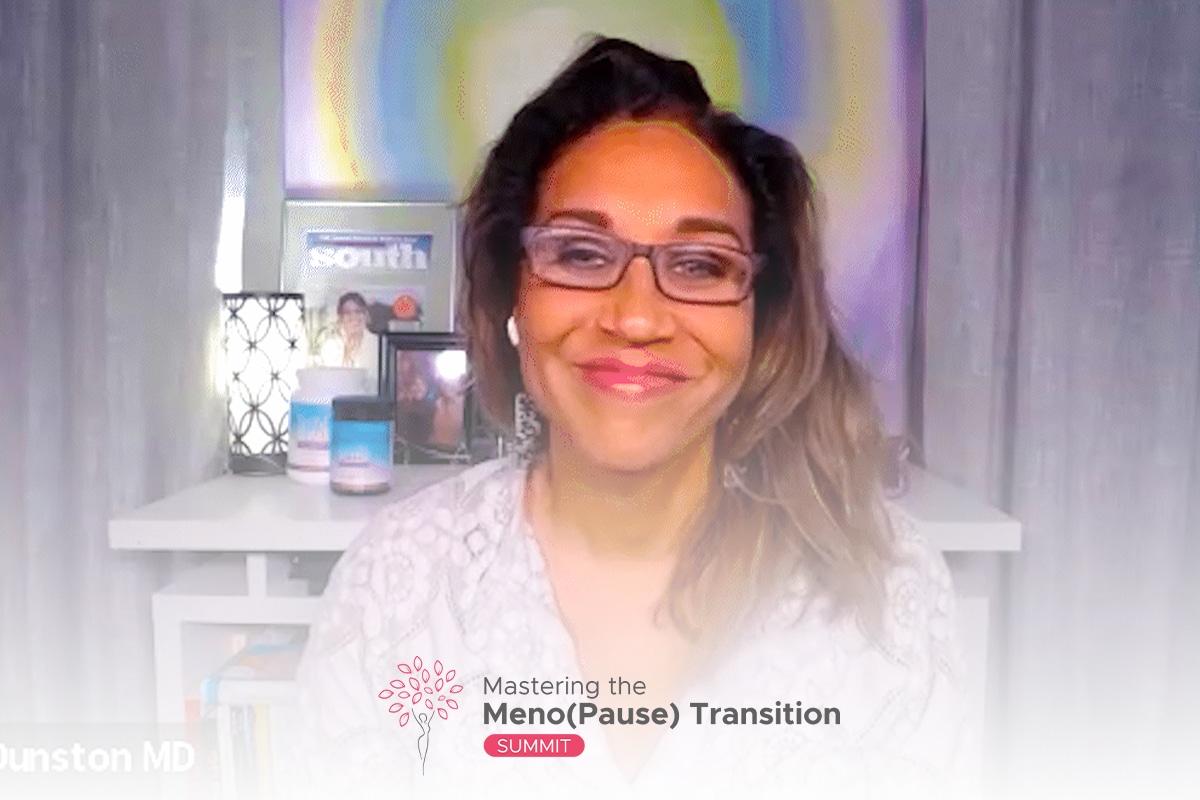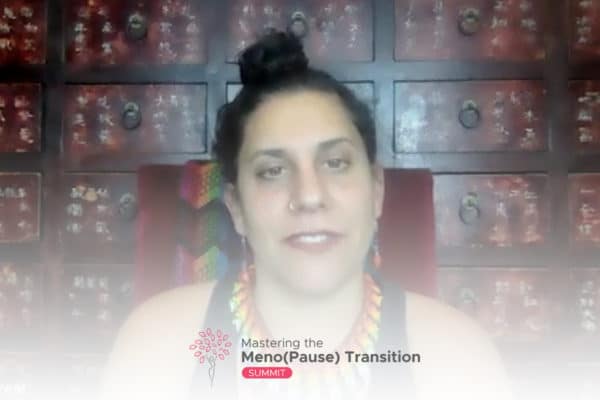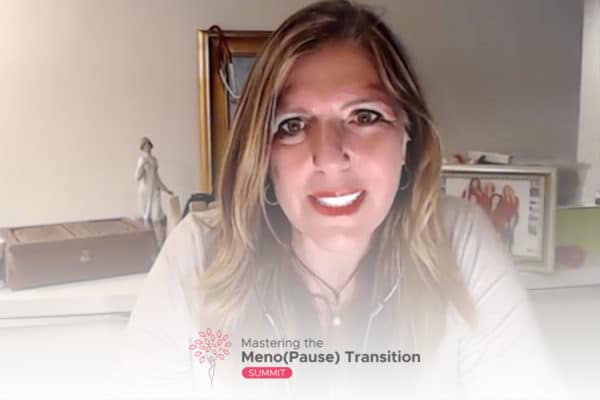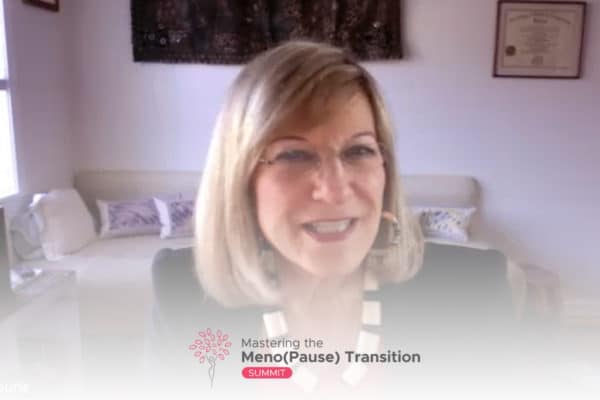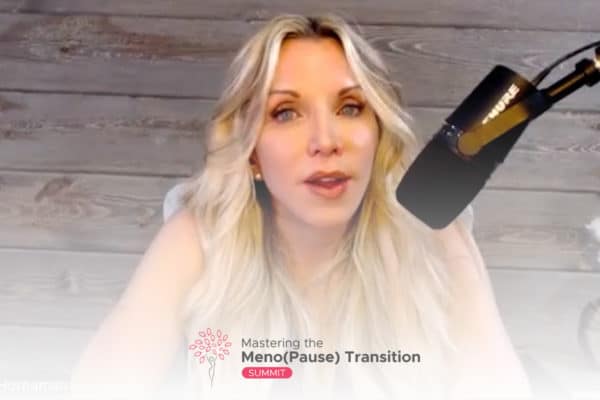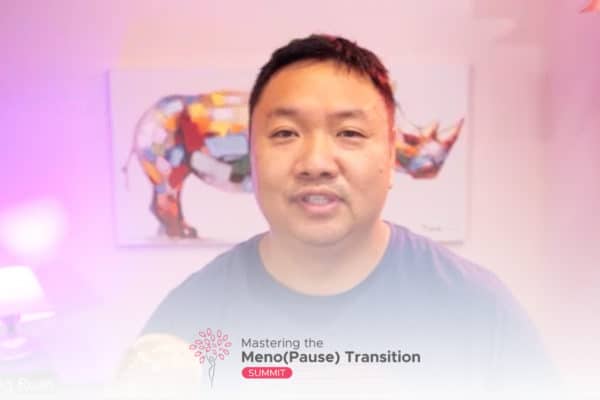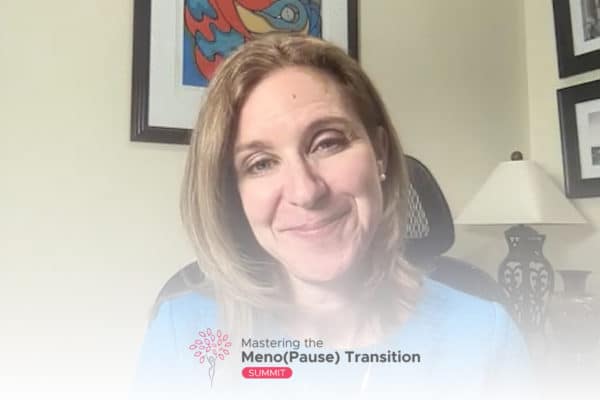Join the discussion below
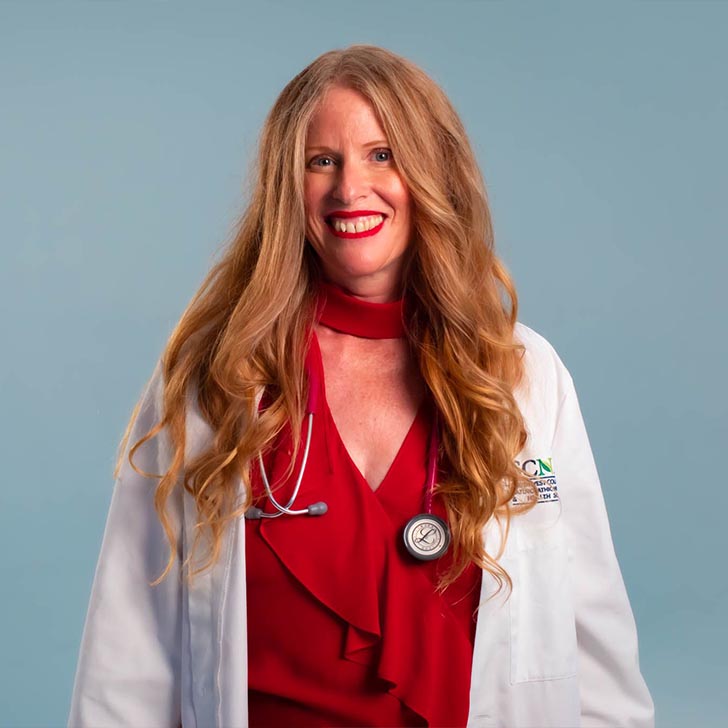
Dr. Sharon Stills, a licensed Naturopathic Medical Doctor with over two decades of dedicated service in transforming women’s health has been a guiding light for perimenopausal and menopausal women, empowering them to reinvent, explore, and rediscover their vitality and zest for life. Her pioneering RED Hot Sexy Meno(pause) Program encapsulates... Read More
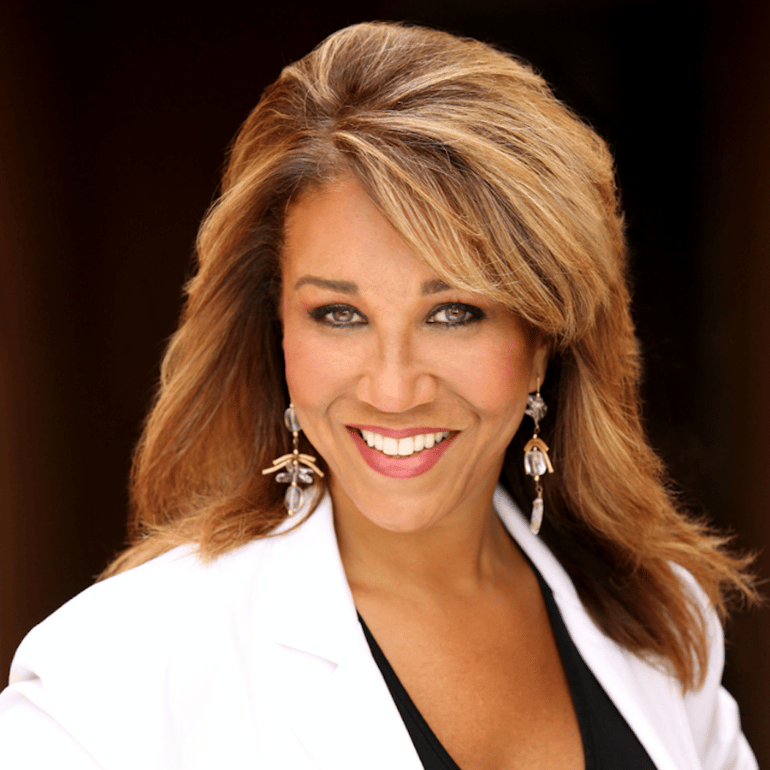
After discovering the hidden cause of midlife weight gain and fatigue in women, OBGYN Dr. Kyrin Dunston lost a life-changing 100 lbs. and fixed her adrenal fatigue. She is fellowship trained in Anti-Aging, Metabolic and Functional Medicine and has practiced this exclusively for over a decade. A pioneer of female... Read More
- Testosterone for women is the forgotten hormone for women that isn’t properly tested or treated
- Testosterone can make or break your menopause
- Essential facts about the need for testosterone in women in menopause
Related Topics
Estrogen, Health Coaching, Hormones, Menopause, Progesterone, Testosterone, Weight Loss, Womens HealthDr. Sharon Stills
Hi, everyone, welcome back to mastering the menopause transition summit. I am your host, Dr. Sharon Stills. I’m excited to be here with my guest today, and I see a furry friend. We are gonna be talking all things testosterone. So today’s gonna be one of those hormone centric focused interviews. As you know, we are talking about hormones a lot here, but we’re also talking about the other things that are important that help you to master your menopause transition. But today is hormone day, so I know lots of you are excited, and here for all the information on hormones. So this is gonna be a great one that you’re not gonna wanna miss. You’re probably gonna wanna get a pen and some paper. You’re probably gonna wanna take notes. My guest, Dr. Kyrin Dunston, is a menopause expert. She is an expert on all things testosterone, so you’re in for a treat today. She has her own story, where she lost, get this, a hundred pounds and fixed her adrenal fatigue. So I know I wanna know about that, I’m sure you do too. She’s a fellowship trained in antiaging, metabolic, functional medicine. She’s been practicing this exclusively for over a decade. She’s been featured on all sorts of media outlets, and she hosts “The Hormone Prescription Podcast”. She’s the founder of The Hormone Club. So she is all things hormones, and we’re excited to have her here today. So welcome Kyrin, it’s nice to have you here.
Dr. Kyrin Dunston
Thank you for having me, Sharon. I’m super excited to be here.
Dr. Sharon Stills
Great, I’m glad that we are on Zoom because I’m definitely allergic to kitty cats. So if we were in the same room, I would be sneezing and on my way to the hospital, but I can admire your cute little kitty cat from afar. Glad he or she is joining us today as well.
Dr. Kyrin Dunston
Yeah.
Dr. Sharon Stills
So I mean, I ask everyone their story, ’cause I think it’s important for the listeners to just connect with you a little, but your story, I’m dying to hear because that is just such a profound. Losing a hundred pounds and keeping it off is no small feet. There have been women lose weight, and then they yoyo up. So tell us, tell us what is your story? How did you lose the weight, what made you get into this, and just tell us everything.
Dr. Kyrin Dunston
Sure, so yeah, I practiced mainstream OBGYN, delivered thousands of babies, did pap smears, hysterectomies, the whole thing. And I loved it, and my health suffered when I was in my forties. So similar to the women that I treated, who were in their forties, right, with what I call the laundry list of midlife complaints. Tired, can’t sleep, can’t lose weight, mood disturbance, irritability, brain fog, losing hair, no sex drive, right? We’ve got this kinda laundry list of complaints that mainstream medicine never seems to really resolve. And that was true for me too, right? I had all these medical problems. I just kept getting bigger, and bigger and bigger. I blamed it on myself. “Oh, I just eat too much, and I don’t move enough.” Tried every diet out there, every calorie restriction diet, all the exercise plans. And I might be able to have some success, but eventually I would gain it back plus more. And it got so bad, where my weight was causing me to have back problems. And they said, “Well, you need surgery, “you need a spinal fusion.” And if anybody knows anything about that, you never have one, right? It just destabilizes your whole spinal column, and you end up with rods up your whole back. Then you can’t do anything, and nobody wants that.
So I was really very desperate, and felt very hopeless because the medicine I trained in, and I went and got my MD degree because I knew I wanted to work with women, and I wanted to serve them at the highest level. So I looked around and I said, “Oh, that means I go get my MD, “and then I’ll have the biggest, baddest toolbox “to help women.” And so then here I am with my big, bad toolbox, going, “We’re not helping anyone. “I’m looking at all my patients in their forties, “they have the same things.” And I was practicing what I was taught to practice, which is what I call, what medicine. What is the diagnosis, what drug do I need to give, what surgery do I need to do? That’s what I was taught to do, so that’s what I was doing. So what, you can’t sleep. Oh, what drug, you need a sleeping pill. What, you don’t feel like yourself? What, you must be depressed, SSRI, right? What, you can’t lose weight, it’s your fault. You need to eat less, exercise more. I was doing the same things with my patients I was doing with myself, and having no success, just like they weren’t. And despite all the pills that I gave, and the hysterectomies that I did, no one ever came into my office and said,
“Oh my gosh, Dr. Kyrin, “those five prescriptions you gave me, “and that hysterectomy you did changed my life. “I lost all the weight, I feel amazing. “I look and feel 20 years younger, it never happened.” And I started saying to myself, “What are we missing? “What are we missing, we’re missing something.” ‘Cause not all women at midlife are like this, there are some who are a healthy weight, have lots of energy and feel great. So what’s the difference. And of course, the difference has to do with our ovarian function programmed to go offline. So I was like, hmm, started doing research, and I really became obsessed with this topic. And like, “What are we doctors missing?” And in my training, my, what I now know is actually a really tiny toolbox from my MD degree, we check everything, right? We check your potassium level, your blood pressure. We look in your eyes, for God’s sake, we stick our finger up your rectum and check the stool for blood. We check everything, but there’s no standard of care for checking women’s hormones. When it comes to women’s hormones, oh, we don’t check that.
Which I never questioned because I wanted to be a good resident, so I just did what I was told. But I started questioning that, and then I discovered, oh, there is a standard of care for checking women’s hormones. Hm, but you can’t do it in blood and have it be very accurate. Oh, you need to do saliva, you need to do dried urine metabolite. So I discovered this whole other world of root cause resolution medicine, where I didn’t realize that if your health’s a tree, we were up in the leaves and branches, trimming leaves, trimming branches. And right, if you have migraines, you go to the neurologist over on this branch, they give you a pill. If you have a heavy crime scene periods, you go to the gynecologist over on this branch, and they give you a birth control pill. If you have a gastroenterology irritable bowel, you go to the gastroenterologist, right. And all these different branches, so you end up with a really misshapen tree with missing branches, and cut off leaves, that kind of hobbles along. But that you could go down the trunk of the tree, into the roots in the soil, and look at what’s causing these leaves and branches to have problems in the first place, and that all the reasons why are the same.
So that’s what I discovered, and then I discovered additional fellowship training in antiaging, metabolic and functional medicine that’s down in the dirt, in the roots. And so I started doing these tests on myself, and, oh my gosh, even though I had checked my thyroid at least 10 times, and it was normal, quote, unquote. when I did the right tests, and I read them the right way, I did have a thyroid problem. Mainstream tests said I had no problem, I was normal. When I did the right test, eight different tests on thyroid, I was hypothyroid. Oh, and when I discovered we could check women’s hormones, so I did them, I was progesterone deficient. When mainstream medicine would tell me, “We don’t check women’s hormones, that’s not a thing.” Right, or some doctors will do a blood test which isn’t accurate, and they’ll tell you you’re normal for your age. So then I started addressing those things, and, oh my gosh, I started losing weight, I started feeling better. And then it just became like Hansel and Gretel following the breadcrumb trail, I was hooked.
So then I started going to conferences, and joined the fellowship program, and I learned about the importance of gut health, and inflammation, and toxicity and mitochondrial health. And this whole world opened up to me of digging in the soil to fix the roots, and then all the leaves and branches got better. So I got off the five prescription medications I was on for depression and anxiety. Five, that they told me I would be on for the rest of my life. I had nothing to be anxious or depressed about, but I was so anxious that I literally would shake. But I’d say, “What am I anxious about, nothing.” There’s nothing to be depressed about. Nothing to be anxious about. All of that had to do with my metabolic dysfunction, my hormones, my toxicity, my gut health, my mitochondria. When I fixed that, off all those medications. So, right, then I had great energy, I looked and felt 20 years younger. My hair grew back, my mood improved, gut healed, everything got better and lost a hundred pounds. And I haven’t looked back since, that was over 10 years ago.
Dr. Sharon Stills
Wow, so that was so very inspiring on so many levels. Not only on a professional level, but on a personal level, that you made these changes for yourself. You truly are someone who practices what they preach, which I think is the best way to go about this medicine. I see so many doctors drinking a Coca-Cola, telling someone else to drink eight glasses of water a day. And so I love that. And you, I don’t know how old you are, but you look like you’re in your thirties. So you’re looking good.
Dr. Kyrin Dunston
Thank you.
Dr. Sharon Stills
So that’s just amazing. Thank you for sharing that with us. And so let’s hop onto the topic, testosterone, because when we hear testosterone, we think men, but we’re here to educate all you lovely ladies today about how you have testosterone too, and why it’s important for you as well. So why do you think that is? Why do you think women are not spoken to about testosterone, and many doctors don’t prescribe testosterone for women, they just give them estrogen or progesterone?
Dr. Kyrin Dunston
Right, so I think there are a lot of reasons why. So both men and women have all three sex hormones, estrogen, progesterone, testosterone. It’s just that women have 10 times the estrogen, men have 10 times the testosterone. This is actually what makes us male or female in utero. Our brains developed differently under those specific hormonal milieu that we come up in. And that’s what gives us our varying reproductive capacity. So testosterone is equally important for women, and estrogen and progesterone are equally important for men, but that’s often mitigated, so why is that? Well, a couple things. One is that I think hormones are very politicized. It shouldn’t be a political issue, but it’s a health issue, but they have been politicized in our culture. So what do I mean by that? Because of various regulations around pharmacy, big pharma, and who can get a patent on what, and who can get a patent on a naturally occurring substance or not, there’s kind of this political war that is going on around bio identical or biologically identical hormones that are the same that a woman naturally has.
Which everything we were born with we have for a reason, because it keeps us healthy, it’s not to harm us. So this concept that that could be harmful to us and cause us breast cancer, for instance, is kind of insane, but nobody’s looking at that. And the confusion that people have, intentionally or not, I don’t know, I won’t say, around that those are the same as synthetic hormones, which are chemically dissimilar from what a woman naturally has. So what do I mean by that, equiline, horse estrogen, not the same as estradiol and estrial that is human. Medroxyprogesterone acetate, which is a progestin, which is not progesterone, which is what women naturally have, right? The whole hormone issue is very politicized and charged. And there’s also this kind of shame. I mean, how all this started being a topic of conversation was in the early 1900s. Early, we didn’t live that long in menopause, we died at menopause. And now because we’ve increased our lifespan so astronomically over the past a hundred years, till now 82, we will live about a third to a half of our life in menopause.
So now it’s a big topic of conversation. Well, when it started being a topic of conversation in the mid 1900s, the whole issue was women are losing their femininity is what was said. So we can restore their femininity by giving them estrogen. They didn’t wanna give biologically identical ’cause they can’t get a patent on that. So they said, “We’ll get horse estrogen from pregnant horses “out of their urine, and we’ll give it to women and restore their femininity, and eureka, right.” So that’s where this conversation started. So it already had a little taboo because of the sexual nature, because it was about a woman’s femininity and her sexuality. And so it had this layered on top, but it also had layered on top this political issue already of giving horse estrogen so we can get a patent. And so fast forward, here we are, this is a huge topic of conversation. Why, because women we’re living a third to a half of our lives in a state of hormonal poverty.
So what do I mean hormonal poverty? Well, it’s just like financial poverty. Financial poverty, you don’t have enough money to fund your life needs and wants and take care of business. Hormonal poverty is you don’t have enough hormones to fund your body’s requirements for basic healthy metabolic function. These hormones are not only about sex, they’re about your entire body function. It’s really a misnomer. You have more receptors for these hormones in your brain than anywhere else. Why, because it’s important for your brain function. And in fact, rates of neurodegenerative diseases like Alzheimer’s are markedly increased in women who go through menopause and don’t use hormone replacement therapy. And studies have shown an up to 77% reduction in the risk of Alzheimer’s in women who use hormone replacement therapy. So they’re very important. So if you’re living in hormonal poverty for a third or half of your life, you’re gonna have problems. All right, so fast forward to why is testosterone so important? Hopefully everybody watching gets it. And if they’re in your tribe, they get it that they need their estrogen and progesterone covered. Well, what about testosterone? Why don’t doctors talk to us about it? So first I think that again, there’s this morality, sexuality issue placed on top of it.
Oh no, testosterone is for men, not for women. If you take testosterone, you’re gonna turn into a man, which is nonsense, right. Or you don’t need it, you do need it. Just like I’m saying a man doesn’t need estrogen and progesterone, they would have a serious hard time with their health if they didn’t have that. So we will equally have a problem if we don’t have testosterone. So I have a personal story about those, Sharon. So back over 10 years ago, when I went on my journey, and I discovered all these things, and I was low thyroid, and I was low progesterone. At that time, I hadn’t gone through menopause yet. And I went through all my fellowship programs, and I did all the tests, and I fixed all the things, and lost the weight and reversed my age literally 20 years. Well, then I was going on, and I would say health is a journey, not a destination. So you have to navigate, you have to keep tracking your hormone levels, and all these different things and adjusting. And at one point, I just started feeling poorly again.
And I was like, a few years after I lost all the weight, and I was like, “What is wrong, what is wrong?” And of course, you know they say that the doctor who treats herself is a fool, but I was trying to treat myself, right. And I was trying to adjust all my supplements, and my hormones and I wasn’t getting better. And finally, I reached out to a colleague and I’m like, “What am I missing, I don’t feel good, something’s wrong.” And of course, she’s like, “Did you test?” “No”, “Well, maybe you need to do a test.” So we all need a guide, including me. So I did, and even though I was using the hormones, estrogen, progesterone, and testosterone, at that time, I had gone through menopause, and a transdermal cream. I must not have been absorbing it, ’cause my level of testosterone had gone down, back down to nothing, and I was miserable. And so I was like, wow, I knew I needed testosterone.
That’s why I was using it ’cause I was deficient, but I didn’t know how much of a role it played. I was literally sitting around on the couch going, “Oh, I’d just rather watch TV and not go anywhere. “I don’t wanna do anything.” And testosterone is the get up and go hormone. If you think of a man, you think of masculinity, what do you think of, you think of strength, power, initiative, drive. And what do guys say when their testosterone is low? “I’ve lost my edge, I’ve lost my get up and go.” They just don’t have that initiative. It’s the same for women. It helps to boost your dopamine neurotransmitter, which is your reward, get up and go neurotransmitter. And when it’s low, one of the symptoms you might notice is that you just don’t feel like doing stuff. You don’t have the initiative. Sometimes women will say, “I used to be the go getter at work.” I work with a lot of successful women. Attorneys, accountants, people who have been very successful in their careers. And they’re like, “I just don’t have it anymore.” So that’s one of the things they might notice. The other thing is we women start losing muscle mass at the age of 30 if we’re not doing something to promote that, or stop that, or reverse it.
And that muscle mass is replaced by fat. That’s one of the reasons that we gain weight as we age, about 3% of weight we gain a year. Well, testosterone deficiency occurs in over half of us by the time we’re menopausal, and so a big factor with that muscle loss is low testosterone. And so if you can maintain your muscle mass, or even improve it, you can stop that fat replacement from happening, and the weight gain. You can improve your insulin function, ’cause your muscles are your biggest glucose, or sugar sink, and you utilizer of it, it’s like a sponge. And whether some women watching might know that they have insulin resistance, it usually occurs with the menopause change. Well, one of the reasons why is because the lack in testosterone decreases that muscle mass, and so that can be a problem.
So women might notice their clothes aren’t fitting the same. They don’t have the same shape that they do. When you think of a man, you think they’ve got those well defined muscles. We don’t have as high levels of testosterone, so we don’t have the big muscles, the hypertrophy muscles, but we do have definition. And when you don’t have enough testosterone, you lose that, and you start looking more blobish and feeling more blobish. So mood, cognition, drive, musculature, energy levels, these are some of the symptoms that women will notice. And now looking back with my incidents where I wasn’t absorbing it, that sometimes happens, it’s called tachyphylaxis. That was why, so then I saw, wow, this is how important testosterone is.
Dr. Sharon Stills
Well, and what I find interesting is that you haven’t even mentioned sex drive. And I think everyone hears testosterone and thinks sex drive. And so I love that you just put together all these really important ways of feeling, and important pieces of our health, and didn’t even mention sex drive yet because that’s how important testosterone is. And I always say the hormones are a symphony, and you have to play all the instruments. Not just the percussion, not just the jazz band, you have to put it all together. And so I love that you’re really just bringing light to testosterone, because I think so many women, even if they do go get bio identicals, are often not given testosterone, they’re just given estrogen, and progesterone. And they’re missing this huge piece, and look at how you were feeling, so horrible, and your estrogen and progesterone, it sounds like were fine. And so I could just imagine if you weren’t obsessed in doing all this research, I could see how many doctors would’ve just missed that in you.
Dr. Kyrin Dunston
Right? And this whole issue of that’s what most everyone, not only doctors, but just regular people, think testosterone for women must be about sex drive. But that is not the most important, it’s about your function. It’s about your overall health and wellbeing. Sex drive is a secondary concern, but it’s interesting because they did this consensus report review of the literature on testosterone use in women. I think it was 2019, and they did a comprehensive literature review, and all they talk about in this consensus statement is the use of testosterone in women for sex drive. And in my opinion, that is the least important function of testosterone. And one of the reasons why most doctors don’t prescribe it, or even look at it, or talk to women about it is because they believe this too. Like I said, I had to go back to school to do a fellowship training to become hormonally literate. I didn’t realize when I graduated OBGYN training that I was hormonally illiterate, but I was, and most doctors aren’t trained in that either.
There are no commercially available preparations of testosterone for women, so it requires a customized prescription to be made. And frankly, the average doctor has no training in that. So they can’t talk to you about it. It’s like going to the hardware store, and you’re like, “Well, I want milk and eggs.” And they go, “Well, this is the hardware store, “we don’t sell milk and eggs.” And so they say go to the milk and egg store. So you have to go to someone who has this training, but it’s funny ’cause women say, “Well, why doesn’t my doctor offer this, “and why doesn’t my doctor know this, “and why doesn’t my insurance pay for this?” And I’m like, “Well, do you go to the hardware store “and have a temper tantrum in the aisle “’cause they don’t sell bread and milk?”
And you’re like, “Why don’t you sell bread and milk?” No, you go to the bread and milk store. But what most people don’t realize, that they’re now waking up to, is the fact that the business of medicine, mainstream medicine, is about what medicine. What is the diagnosis, what drug, what surgery? It’s not about why medicine, and it’s about symptom management, not the creation of health, and the alleviation of symptoms because you’re fixing the root causes. So I think people are waking up to this now and they go, “Oh, I need to go to the milk and egg store.” Go to a different place with people with that expertise, like you, like me, so that they can get their needs met, and feel amazing, and get access to the treatments that are needed.
Dr. Sharon Stills
Mm, I think that’s such an important point you brought up, because we expect our OBGYNs to understand hormones. And so when we go in with that expectation, and we’re misled with their treatments, we just think, oh, okay, it must not be our hormones. And so one of the most important sentences, probably that we’ll hear in this whole summit, is just what you just said, that they are illiterate when it comes to hormones. So you can’t expect to go to the OBGYN and get proper treatment. And I love your hardware store and milk and eggs analogy. That’s a good one, so it’s so true, so, so true. So testosterone, how do you know, does every woman need testosterone? How does a woman know if she needs testosterone? Do women need it before they go through menopause? What’s been your experience?
Dr. Kyrin Dunston
Well, we need it, otherwise we wouldn’t have it, right? Everything we’re born with, we need. We need calcium, magnesium. We need progesterone, testosterone. We need our neurotransmitters, right? We need it at healthy levels. And so in the thirties to forties, when we start going through perimenopause, about half of women will become deficient. In my experience, when you get to menopause, although the data would say it’s half, it’s way more. And the women I work with who are all pretty much over 40, it’s more like 80 to 90% are testosterone deficient. So this is super important, we didn’t even mention the effect of testosterone on your bones, you start losing bone mass at 30 also. And everybody talks about estrogen for bones and osteoporosis, but nobody says, testosterone, you need testosterone for that. So we all need it. Now, I am a proponent of women, all women, getting their hormones checked early and often. As soon as you learn about this at whatever age you are, you need to get a comprehensive panel, that includes dried urine and salivary testing. And then I think that women should at least get it annually when they’re younger. And then as they start going through the perimenopause in their forties, probably more frequently, especially if there are symptoms. And then if you are testosterone deficient, that is one of the hormones that you should be talking with your provider about replacing, for all the reasons that we talked about earlier.
It’s kind of like if you hire me to come give you window treatments in your house, sometimes you go in these houses and they have these drapes that just hang on the side dead panels and they don’t close. And I always wonder why. Don’t you wonder that, Sharon? Why don’t you make drapes that close, so you can actually close the drapes. And it’s kind of like you hire me to do that in your house, to take care of your hormones or, and I go, “Oh, we only need to look at “and talk about your estrogen and progesterone.” Those are those drapes that just hang on the side, who cares if the light can come in, you don’t have any shade cover or privacy? So it’s incomplete. And this idea, oh, that’s a man’s hormone. Oh, it’s only about sex drive. Oh, you’re gonna grow a beard.
Now, having said this, I have seen testosterone mis-prescribed, if that’s the word and people given way higher doses, women, than they were supposed to, than they should have been receiving. So you wanna make sure you have someone who knows how to monitor your levels to get you to physiologic levels. We’re not talking about supra or above physiologic dosing, you may be familiar with some body builders who they used to do that, probably there’s some that still do. Because if you give high doses of testosterone, that muscular hypertrophy, you can really push that to the limit. We’re not talking about that. We’re talking about your calcium is low, your bones are thinning. Let’s get your calcium up to where it needs to be, let’s give you a little calcium. Let’s give you enough testosterone to get you where you should be.
Dr. Sharon Stills
Mm, such a good point. So what are your favorite ways for monitoring, for someone listening who is saying, “Hmm, I feel like I relate to this.” What do you recommend they do, how do they get started, what should they be asking for?
Dr. Kyrin Dunston
Well, you definitely wanna appropriate testing. Tests don’t guess, and you want the right test, so blood is not accurate for these hormones. These hormones are steroid hormones, which means they’re made from cholesterol. Cholesterol comes from your fat, fat is oil. So these hormones are oily, blood is water. So these hormones are not, oil and water don’t mix, they’re not just having a pool party in your blood, and you can just sample and see how much you have. They’re carried around in little protein carriers I call FedEx trucks. So blood is inaccurate notoriously for these levels. So you want either a saliva test, or you want dried urine hormone.
There are some fingers stick capillary blood ones that are good. So you want to have the right tests, and you want them read by someone who knows how to read ’em. ‘Cause I’ve seen people have the right tests, and then their provider, you can even buy some of these on the internet yourself. And then they take it to their hormonal literate doctor, and they say, “Oh, tell me.” And the doctor looks it and goes, “Oh, you’re fine. “Nothing to do.” ‘Cause they don’t know how to read it. So you have to know how to read it. And then you need a prescription. You need someone who knows the art and the science of giving you a prescription for exactly what you need. And this is why I created the hormone clubs, so that women can access this. Because there are women all over Facebook like, “I got this test, I don’t know how to read it. “I don’t have a prescriber, my doctor says I’m fine and I’m so not fine.” So we needed more resources, and so that’s why I created that. So you want people who are trained in this to help you.
Dr. Sharon Stills
Mm, yeah, you’re providing so much hope. Since the beginning you’ve started talking, there’s just hope, you exude hope for women who are listening. That there are answers, that even if you see someone, and you’ve had the right test, and they tell you there’s nothing wrong, but you still know inside, and you feel off, that there’s hope that you just have to keep searching and find the right person. So I am curious, ’cause I totally agree with you that blood is not an accurate way. Although I have sort of found that… I love your analogies. So the pool party, that’s not going on in your blood with hormones. And I never really use estrogen, progesterone in the blood. I think it just totally misleads doctors, and patients, and women get taken off hormones that they should be on, or they get put on too many. But sometimes I’ve found, ’cause I play around and I test, sometimes I found the testosterone, when I have a woman on testosterone and I’m checking her in a 24 hour urine, that I’ll do a blood, and sometimes it correlates. I’m just curious if you’ve played around with that at all, or what your thoughts are on it. Or I’ll run DHT in the blood, and that seems to be accurate for classes.
Dr. Kyrin Dunston
Yeah, I mean, early on I played around with it, ’cause I was like, “That can’t really be true. “We check everything in blood.” I was gonna defy and check it, and I would check saliva, and I would do all this cross checking. And I very quickly found, number one, progesterone, totally inaccurate. But also, estrogen and testosterone, not accurate. It’s like, how can you properly manage someone if your measuring stick is wrong? You’re always hitting a moving target that’s incorrect. And so why use that when the dried urine is my preferred. Has superior accuracy, I don’t know about you, but that’s what I would do for myself, is the best, most accurate one. And why go through getting blood drawn if it’s not gonna be accurate? And then guessing, and crosschecking, and I just go with what is accurate.
Dr. Sharon Stills
Yeah, the women on here, they’ve been listening to me on the talks, they know that I won’t allow my patients to get their refills, unless they’re doing their 24 hour urine tests and they’re checking and testing. I hate to act like a pain, but it’s for their safety. It’s to make sure that everything is metabolizing properly, and their dose properly. And things change, our stress levels change, our toxicity exposure changes, and sometimes our hormone needs change. It’s a commitment to yourself, and to your health. and if you’re gonna commit to that, then you have to commit to testing, and watching and making sure things are appropriate. So overdosed, what have you seen women who are overdosed? Are they growing beards, are they breaking out in acne? What are they experiencing?
Dr. Kyrin Dunston
I had this one patient come to me when I first started doing this years ago. And she comes in and says, “Hey, Dr. Kyrin, “I’ve been getting these pellets, “and I don’t know what’s happening. “But I’m walking down the street having orgasms, “and I don’t think I’m supposed to have that.” She says in this deep voice, right. And so I immediately diagnosed her with too much testosterone. Yeah, and so she was overdosed. And again, this gets to the blood problem. And there are a lot of people who use pellets, and they only follow blood levels. And in my opinion, that is a no bueno. I had to switch to pellets for my testosterone years ago, ’cause I was tachyphlaxic and couldn’t absorb it anymore transdermally. And I monitor it with the same dried urine hormones, so I get that sweet spot, so I got her straightened out. The problem is with both estrogen and testosterone because they’re steroid hormones, that if someone gets overdosed, it feels really good. You could create a estrogen or testosterone addict out of anyone. If you give them enough estrogen and testosterone, you feel so good.
If it’s ever happened to you, if anyone here has ever taken steroids for any reason. Say you had a bronchitis, and they gave you prednisone for a few days, you know what I’m talking about. You feel so good, you’re like, “I can clean my whole house. “I don’t have to sleep for three days.” You feel amazing, well, estrogen and testosterone are similar, and they will make you feel really good and high. So you can create this addict. So it’s very hard to get people who have been up there, like she was, down, because they start feeling like, “Oh, I don’t feel so good anymore. “I want some more of that stuff.” But you do have to detox it, it’s very delicate. You gotta get the liver to get it out, and get the levels down. And there’s certain things that you can do to help people come off of that. Because all of these hormones, estrogen, progesterone, testosterone, I say they’re Goldilocks hormones. What do I mean by that, they got a sweet spot. Too much, no bueno, too little, no bueno. Sweet spot, just right, right. Just wasn’t it Goldilocks who goes in, the bears come in–
Dr. Sharon Stills
The porridge.
Dr. Kyrin Dunston
Right, yeah, eat the porridge. So they’re Goldilocks, they gotta be just right. So you can have just as many problems too high, too little, and this is why monitoring is super important. If you are on hormones, you for sure need to be getting checked, at my opinion, at least twice a year. Which, like you said, Sharon, it’s a commitment. But in my opinion, because all of these hormones are going to preserve my brain function and help me not get dementia and Alzheimer’s. They’re gonna preserve my eyes, and help me not get macular degeneration and go blind. They’re gonna preserve my heart, and help me not have a heart attack or a stroke. They’re gonna help my bones so I don’t get thin bones, and then fall and have a hip fracture and die from it. Right, all these things we don’t want to have happen. They’re my number one candidate to help me stay healthy. And so I’m committed to monitoring it and managing it on my journey.
Dr. Sharon Stills
Mm, and I wanna add, I use testosterone frequently in the treatment of breast cancer. And so there is so many profound, and we are echoing that on here, that it’s great to get rid of your symptoms, but by now, identical hormones are just like you said. They are so much more, they are a preventative treatment against some of the most chronic inflammatory illnesses. So I wanna talk, and then I wanna go back to the overdosing. Because I have always come from this philosophy of staying away from pellets because that is just what I’ve seen. I was taught to use transdermal creams. And I actually use them transmucosally because you don’t get that dermal fatigue. And so using it to the external labia, I find women don’t get the fatigue. They can use low doses and still get. So I kind of am this like no pellets, no pellets. I’ve just seen too many women who’ve come in, and they’re like, “You said they’re overdose, “they’ve been followed in blood.” They’re not doing well, they’re really outta whack, and I have to detox ’em, just like you said. But it sounds like you have had some good experiences with pellets, or that there is maybe a way to do them where women are not just getting so overdosed. They feel great, and then they crash, and then they get kind of addicted, and they gotta go get their pellets.
Dr. Kyrin Dunston
Right.
Dr. Sharon Stills
I’d love to hear your thoughts on that.
Dr. Kyrin Dunston
Yeah, I think there is a big cadre of, I mean, I guess I can say the bio tea people. And they’ve made a business out of it off of a book that is basically everyone gets estrogen and testosterone pellets, they follow blood, they may or may not be of progesterone. And I have seen lots of those people overdose. Even in my coaching programs, the women come in and with the pellets, and they’re like, “I feel terrible, but I’m on these pellets “that are supposed to be the elixir of life, help me.” And when we do the right test, ’cause they’re only getting followed with blood, and we do the dried urine, they’re totally overdosed, totally. So I think it’s the measuring method they’re using. And also, I don’t think that they necessarily teach the importance of proper progesterone dosing. And again, they’re only following blood.
So I have seen lots of disasters, I’m with you on that. But I think in the right skilled hands, like yours or mine, where we know this, and we know better than to do blood, and we’re gonna follow the dried urine or urine test, you can dose it appropriately. I still use a testosterone pellet to this day, and I have patients who do it. But when you do the right monitoring, then you can get the dose better. So I haven’t become a testosterone junkie, I don’t have a beard, right. Sometimes I worry, like, is my voice getting deeper? I’ve always been an alto though. I sing in the chorus, that hasn’t changed. And so I think I’m doing pretty good. And in terms of my bones, and my libido, and all this stuff, I’m doing fine. And that’s been my experience, that there is this finesse. And I love how you talked about the labial application. There is as much an art to this science as there is science to this science. And so you need somebody who knows how to navigate that. I mean, I’ve had people on sublingual drops, trophies, labial. I mean, you there’s so many ways to get these things in, and not ways are right for all people at all times.
Dr. Sharon Stills
Right.
Dr. Kyrin Dunston
So you have to have a guide who knows how to help you navigate this journey.
Dr. Sharon Stills
Good point, and I didn’t know that they are prescribing testosterone and estrogen without progesterone. That seems dangerous and inappropriate. I wonder how they even came to decide upon that. Why they left out progesterone, do you know?
Dr. Kyrin Dunston
I’ve seen it, I haven’t read their book, and so I haven’t done their training. I don’t know, but I’ve seen it more than once. In historicamized and non historicamized women, and I just scratch my head and go, “Geez, what?” And I think it’s this idea of a lot of the marketing around the bio tea, I observe, is very much, “Come do this weekend training “and earn all this extra cash in your practice”, unfortunately. And so it’s not necessarily the same rigorous training that you get in when you get your naturopathic degree, or doing a fellowship in antiaging, metabolic and functional medicine. Mine took seven years, you can do it faster, but that’s how long it took me. So I think that they don’t necessarily know, and just like mainstream doctors don’t know, they still will tell women, “You’ve had a hysterectomy, “you don’t need progesterone.” Wait a minute. Any woman watching this, if you get nothing from this, progesterone is not just to protect the uterus against cancer. And that’s what I say, that mainstream doctors are hormonally illiterate. It’s not an insult, it’s not meant as an insult. It’s meant as being discerning. That they don’t understand that, oh, your brain needs the progesterone to help prevent deterioration of neurons and dementia. Right, your breasts need it, right. Not just your uterus, so I don’t know the answer to why, but I do know that the women watching here need to know better and just say no.
Dr. Sharon Stills
Hmm, and it is so individualized. I mean, I’ve been doing this over 20 years now, and there’s the Goldilocks sweet spot, and there’s what you expect. And you give a woman a certain amount and she does well, but there’s always outliers. And that doesn’t mean you’re not a good candidate for hormones or they don’t work for you. It just means maybe you need to change the form, or what you’re doing, or look at your liver, or look at your lymph, or look at something else. And so don’t let someone tell you, “Oh, you’re not a good candidate, these don’t work for you.” Just as you said, it’s an art form as well as a science. And so do you find, with testosterone, that a lot of women are over converting to DHT, and they’re having problems with their hair? Do you see that as being an issue?
Dr. Kyrin Dunston
I mean, you definitely wanna test, don’t guess. Are you alpha dominant, and going down that pathway, where you could have hair loss or male pattern hair growth? I do not see that in the majority of women. Some will, and then there are things you can do to block that pathway and reduce it. You can use saw palmetto, there are medications, finasteride, that can help with that. But I can’t remember the last time I had a woman who needed that, it’s been years.
Dr. Sharon Stills
Probably ’cause you’re not overdosing them.
Dr. Kyrin Dunston
‘Cause you’re not overdosing.
Dr. Sharon Stills
Very good point. So anything else that we didn’t discuss? This is our testosterone know it all episode. Is there anything else, ’cause I totally agree. As you’re talking, I’m thinking about patients that I have. And just one recently, who when she wasn’t on her testosterone, just felt horrible.
Dr. Kyrin Dunston
Oh yeah.
Dr. Sharon Stills
And the lab had shown that she had too much, and so we took it down. And it was like night and day, from her workouts, to her mood, to anxiety, to just all these things. And so we always rely on labs, but we also look at the patient, and we marry the two together. And in your symptoms and how you’re feeling is what matters, because sometimes you will need to be a little higher, and that’s your sweet spot. And so she was so grateful when I said, “Okay, you can go back on this dose.” And just within a week, it was like her life returned and she felt much better.
Dr. Kyrin Dunston
I literally say it’s what turns the lights on in the house. And when I now look back at that time when I wasn’t absorbing the testosterone and didn’t realize it. It was like the lights are on, no one was home. That’s how I felt, like, yeah, I’m here, but just no vava boom. And then I got my testosterone back, and it’s like, woo. It’s like, takes you from gray to sunshine. I wouldn’t be without it. So I think what’s important for everybody listening to know is that testosterone is as important for you as estrogen and progesterone. Don’t let anybody tell you otherwise. Test, don’t guess, do the correct test and have them read the right way. Find a hormone literate practitioner who can work with you to get you a proper assessment, and proper treatment, and then monitor you on your health journey so you can have optimum outcomes. But just don’t neglect testosterone. It’s not only about sex drive, sure, sex drive is important, but it’s about so much more than that. So don’t neglect your testosterone.
Dr. Sharon Stills
Mm, I feel like we have redeemed testosterone. And so importantly, and for sex drive, I’ll just throw out a little tip. If you are having problems reaching orgasm, often I’ll have women apply the testosterone right to their clitoral area. And for some women, not everyone, but for some women that will just work like a charm, and it will turn your sex life around. So we’re certainly pro-sex, pro-sex life, pro orgasm, but we’re pro healthy aging. And so if your bones are breaking, and heart is inflamed, and your brain is inflamed, then sex is at the bottom. We have to be healthy before we can enjoy a sex drive, and testosterone is certainly a key piece. And I love that you also brought up about its connection with dopamine. And so when you’re feeling addicted, or you need to see that like, or you need to go shopping, or you need that sweets, you need to also look back to your testosterone levels and see can low testosterone be driving some of these addictive behaviors. So that was such a important point as well. So this has been amazing, thank you so much. And I know you have a free gift for the ladies, that I know they’re gonna wanna read, so what is that? Maybe just explain a little?
Dr. Kyrin Dunston
Sure, so the reason why I want everyone to have this is, we all at midlife think that it’s about a prescription, and about estrogen, progesterone, testosterone, but actually there are other hormones you need to balance you don’t need a prescription for. And the most important one is insulin, and it starts with what you eat. And so what I’m gonna give you is my “Diet Deceptive Dozen”. 12 foods flying under your radar, keeping you overweight and tired at midlife, and your hormones unbalanced. So you get the guide and I’m gonna take you through things you need to just immediately get outta your diet. I’m also gonna tell you what to replace it with, don’t worry.
Dr. Sharon Stills
Woo!
Dr. Kyrin Dunston
So you’ll get my lean 15 report, 15 foods to add. So you’ll be all set. But if you can get that one thing down, you’ll be amazed at how much it goes to balance all your metabolic hormones, so I hope you enjoy.
Dr. Sharon Stills
Fantastic, thank you for sharing that. And it is, it’s so multifactorial. And once you work with someone who understands how to help you balance your hormones, to me, the hormones are the easy part, and then it’s all these extraneous things. And so knowing what you’re eating, ’cause you could have all these great balanced hormones, but then you’re sabotaging with your diet. And so it really is a global multifactorial. So I can’t wait to read the guide. So thank you for sharing that with us, and thank you for taking the time to be here today, and share your expertise, and just sharing your knowledge, and your light, and your wonderful personality, and all your amazing analogies, I love them. I use the Goldilocks analogy all the time, but I’ve never used any of those other ones. So they were just fantastic to hear. And just for giving us hope, for showing us personally, that at any time you can get control of your life, and you can make a change and health can be waiting for you. And for giving us hope that there are physicians out there who opened up their eyes and said, “I have great training, I am an MD, “but there’s more I can learn to help people.” So so appreciate that, so thank you for being here.
Dr. Kyrin Dunston
Thank you for having me, Sharon.
Dr. Sharon Stills
Oh, you’re so welcome. And for everyone else, this was a good one. This was a good one, I hope you took notes. And I hope now you are embracing testosterone as part of your journey, as part of the healer on your journey. And I look forward to seeing you all in our next little chat, so be well till then, bye.
Downloads

